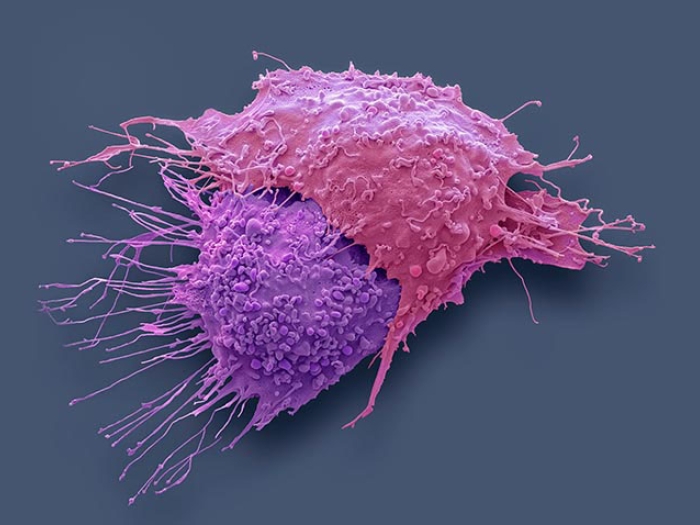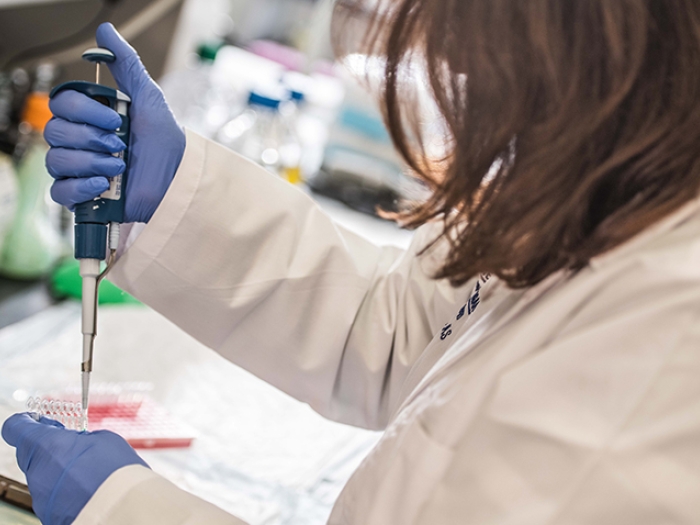New research explains why this difficult-to-treat disease becomes resistant to chemotherapy, suggesting potential future treatment options.
8:00 AM
Author |

Inside each ovarian tumor, there are good cells and bad cells.
A new paper explains their roles:
-
The bad cells are fibroblasts. They work to block chemotherapy, which is why nearly every woman with ovarian cancer becomes resistant to treatment.
-
The good cells are immune T cells. They can reverse that resistance.
These findings, reported in Cell, suggest a different way of thinking about chemotherapy resistance — and the potential to harness immunotherapy drugs to treat ovarian cancer.
"Ovarian cancer is often diagnosed at late stages, so chemotherapy is a key part of treatment. Most patients will respond to it at first, but everybody develops chemoresistance. And that's when ovarian cancer becomes deadly," says study author J. Rebecca Liu, M.D., associate professor of obstetrics and gynecology at the University of Michigan.
"In the past, we've thought the resistance was caused by genetic changes in tumor cells. But we found that's not the whole story," she says.
Researchers looked at tissue samples from ovarian cancer patients. They separated the cells by type to study the tumor microenvironment in cells and in mice. They then linked their findings back to actual patient outcomes.
In the past, we've thought (chemotherapy) resistance was caused by genetic changes in tumor cells. But we found that's not the whole story.J. Rebecca Liu, M.D.
Ovarian cancer treatment
Ovarian cancer is typically treated with cisplatin, a platinum-based chemotherapy. The researchers found that fibroblasts blocked platinum. These cells prevented platinum from accumulating in the tumor and protected tumor cells from being killed off by cisplatin.
Immune T cells, on the other hand, overruled the protection of the fibroblasts. When researchers added the immune T cells to the fibroblasts, the tumor cells began to die off.
"T cells are the soldiers of the immune system. We already know that if you have a lot of T cells in a tumor, you have better outcomes. Now we see that the immune system can also impact chemotherapy resistance," says study author Weiping Zou, M.D., Ph.D., Charles B. de Nancrede Professor of Surgery, Immunology and Biology at the University of Michigan.
By boosting the immune T cells, the researchers were able to overcome the chemotherapy resistance in mouse models. They used interferon, a type of small protein, to manipulate the pathways involved in cisplatin.
The researchers suggest that combining chemotherapy with immunotherapy may be effective against ovarian cancer. PD-L1 and PD-1 pathway blockers are Food and Drug Administration-approved treatments in some cancers, though not ovarian cancer.
"We can imagine re-educating the fibroblasts and tumor cells with immune T cells after chemoresistance develops," Zou says.
"Then we could potentially go back to the same chemotherapy drug that we thought the patient was resistant to. Only now we have reversed that and it's effective again," Liu adds.
This approach requires additional clinical testing before it can be used with patients.

Explore a variety of health care news & stories by visiting the Health Lab home page for more articles.

Department of Communication at Michigan Medicine
Want top health & research news weekly? Sign up for Health Lab’s newsletters today!





